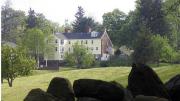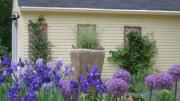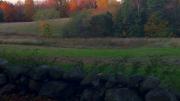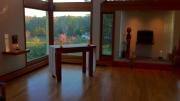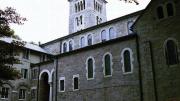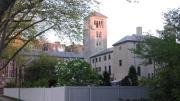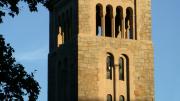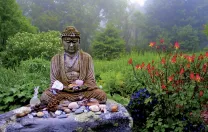The Society of St. John the Evangelist, a small monastic community of the Episcopal Church, has two locations with open chapels and retreat accommodations. One is the Colonial-era Emery House (with more modern guest cottages down the hill) on nearly 150 acres of forests and rolling fields along the Merrimack River in West Newbury, Massachusetts. The other monastery is along Memorial Drive in Cambridge (on land originally donated to the society by Isabella Stewart Gardner): a Romanesque-looking, 1920s stone structure facing the Charles River that recently underwent an $11-million renovation. Twelve guest rooms are available there, with simple furnishings and access to a communal kitchen for snacks and drinks and to a living room with comfortable chairs and plenty of books.
In both places, silence is observed even during meals (which are shared with the monks), although classical music is played and, in Cambridge, one brother recently read aloud from a biography of Dietrich Bonhoeffer during dinner.
Retreatants are welcome Tuesday through Sunday during every month but August; most stay three or four days at a time, and many return annually. “People come here for all sorts of reasons; we’ve had believers and non-believers, Jewish people, and all stripes of Christians,” says James Koester, the senior brother at Emery House, who has lived there for 20 years. He does the cooking and the chores necessary to run the property (like feeding the chickens, mowing the fields, and tending the beehives) along with two other brothers. “What we’re offering is an opportunity to share our life of community and prayers,” he explains. “The way to commune with God here is through nature.”
Even those visitors underprepared to spend their days in silence have left with a deep appreciation of how that practice slows them down and accentuates the sounds of the birds, the wind, the rushing river—often sounds they have never really listened to before, Koester reports. “The gift of silence allows people to start to lis ten to God speaking and to experience being in the world in a different way,” he adds. “Sometimes people sit silently and just watch the light on the landscape change throughout the day.” Daily mass, prayers, and Eucharist are optional for guests, as is arranging private counsel with the brothers.
The atmosphere at both of the society’s retreats is peaceful and open as long as guests are respectful of life there. Artists can paint, for example. And when asked if alcohol is permitted, Koester smiles. “We don’t look through people’s luggage. If a little toddy at the end of the day is something they find helpful, that’s fine,” he says. “I know I do.”
